- Details
Hello, Claude, and thank you for your participation in our "Why Consulting?" series
AFAM: Please tell us more about what your consulting role is about?
Claude: I started an innovation consulting firm (SVA Innovation) with a partner a year ago. We have 8 part-time employees in Silicon Valley, 1 in Japan and 12 full-time in China. We offer several programs: incubation for entrepreneurs prior to raising venture capital funding, innovation management for established companies and we assist western companies who want to establish themselves in the Chinese market. As in every small firm, my partner and I do just about everything that is needed to get business and to make clients happy with our services.
AFAM: How did you get where you are now?
Claude: After school (Angers 74 and Stanford MBA 82) I spent 23 years at Intel where I managed several divisions and ended up running Intel Capital International, part of the corporate VC arm. Then I worked in a small independent venture capital firm, started a solar company, and joined several boards of directors of private and public companies. My last corporate job was at SRI International, an R&D organization, where I was managing the Center for Innovation Leadership. So, over the years, I have learned about managing technology, taking it to market, raising money and making a return for investors. My colleagues all have similar profiles: successful executives, board members, investors.
AFAM: What does your typical day look like?
Claude: There is really nothing like a typical day. I have 4 primary activities and the mix changes all the time. First, I need to find clients, so I spend a lot of time on the phone/email/WeChat/etc, generating proposals, price quotes and the like. Then when we have a new assignment we need to create the information we will need to satisfy the client’s requirements (PowerPoint skills are important). This involves a lot of interaction with the client and with my team of consultants. Then when we deliver the results or hold a workshop we travel to the client’s office, China, Japan and Korea for the most part. This means a lot of public speaking. Finally, is what I call administrative minutiae: accounting, paychecks, taxes, office supplies, travel arrangements and more.
AFAM: What do you like in your consulting role?
Claude: The most important aspect is that I work with smart people all the time. I get exposed to many new technologies and markets. I find this very stimulating. Of course, I am trying to make the clients benefit from my experience but at the same time I am learning a lot from them. In addition, I am at a stage in my professional life where I can decide who I work with, and that includes respectfully declining to work with difficult clients and consultants (the “No assholes” rule).
AFAM: What are the challenges of the consulting job?
Claude: This may seem obvious but before you can actually start a consulting assignment you need to have clients. So, half my time is spent on business development, that is finding new clients. I also do a lot of follow-up with past clients to try and get more business from them. I suppose I would have the same challenges if I had started a bakery or a car repair shop.
Beyond that, the top issue is to make sure the client’s expectations are aligned with what we can reasonably provide. As an extreme example, we had a government official ask us last year to create unicorn start-ups in his city which had a strong manufacturing base but no university and no investors. We passed. Setting expectations correctly at the beginning is a key element of client satisfaction.
AFAM: I can't refrain from asking, how did the recent corona virus outbreak influence your day-to-day work?
Claude: I came back from China two days before Wuhan went into lockdown and right as my staff members were leaving to go see their families for Chinese New Year. They were not able to come back to the office until 6 weeks later. We adapted by working online from Silicon Valley and all over China. We turned several of our innovation workshops into on-line sessions that we are started to deploy this month (March 2020). We have not lost any business but we have not been able to get any new one, of course. I have spent more time generating proposals for prospective clients in Japan and Hong Kong.
AFAM: What skills and qualities do engineers need to be successful consultants?
Claude: You need to understand that consulting is a people business. You can start in a large firm such as Bain, BCG, McKinsey or Pwc as an analyst and if you want to really succeed and make it to the top, you must excel at client contact and relationship. If you start your own firm like I did, you have the same set of issues. The analytical skills learned in engineering skill school are super useful to get started, they are the base upon which you can build new skills and a practice.
You also need to be comfortable with the fact that in a consulting role you suggest to the client what to do but in the end, he decides and you do not implement your own ideas. Imagine designing a wonderful new machine and having someone else build it. Some days this can get frustrating and you must accept that is an integral part of the consulting profession.
AFAM: What advice would you give to an engineering student who wants to work in consulting? Start as a junior in a large management consulting company, find an internship in a boutique firm, become an expert in a certain field before breaking into consulting........?
Claude: I believe, there are two possible paths to a consulting profession. One is to start early in one of the big consulting firms such as those mentioned above. You will learn on the job and become a professional consultant. The other is to wait until later in your career, when you have experience and expertise to monetize. Either one is fine, it really all depends on what sort of business life you prefer to have. If you put your heart and energy into either path, you will succeed.
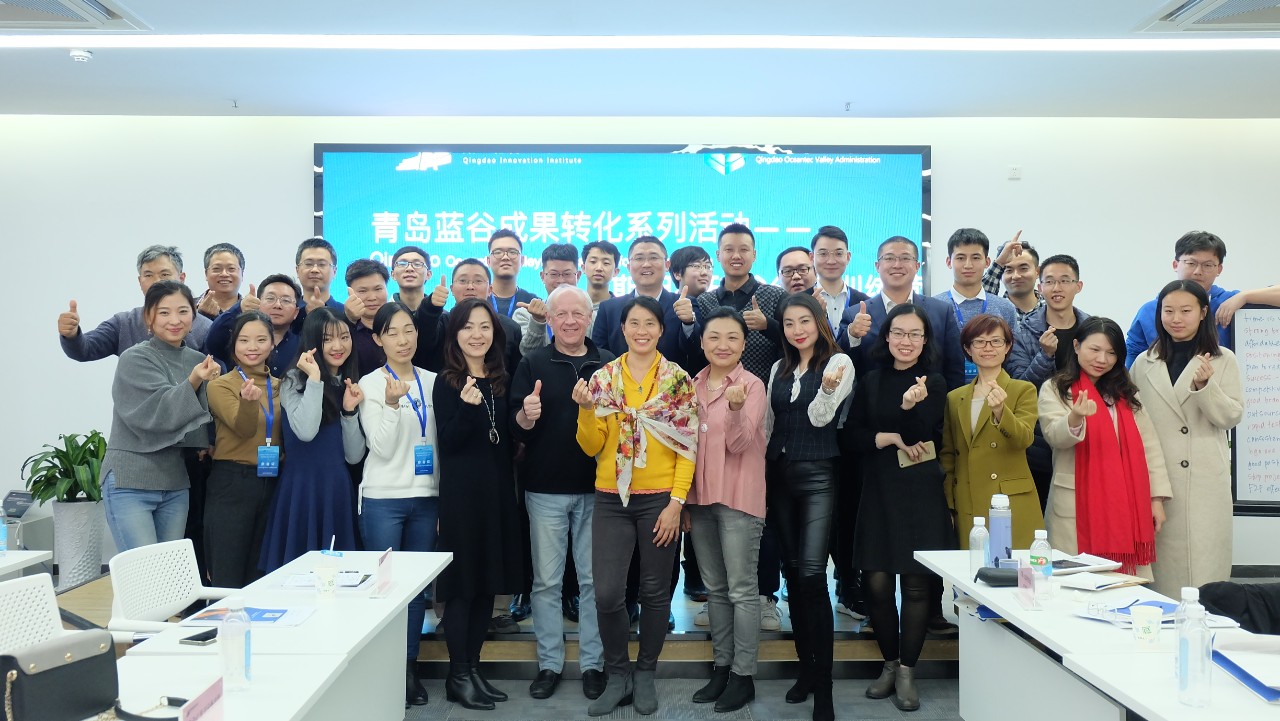
Photo courtesy of Claude Leglise: US consultants, China staff at SVA Innovation and the participants in the first incubation program in Qingdao
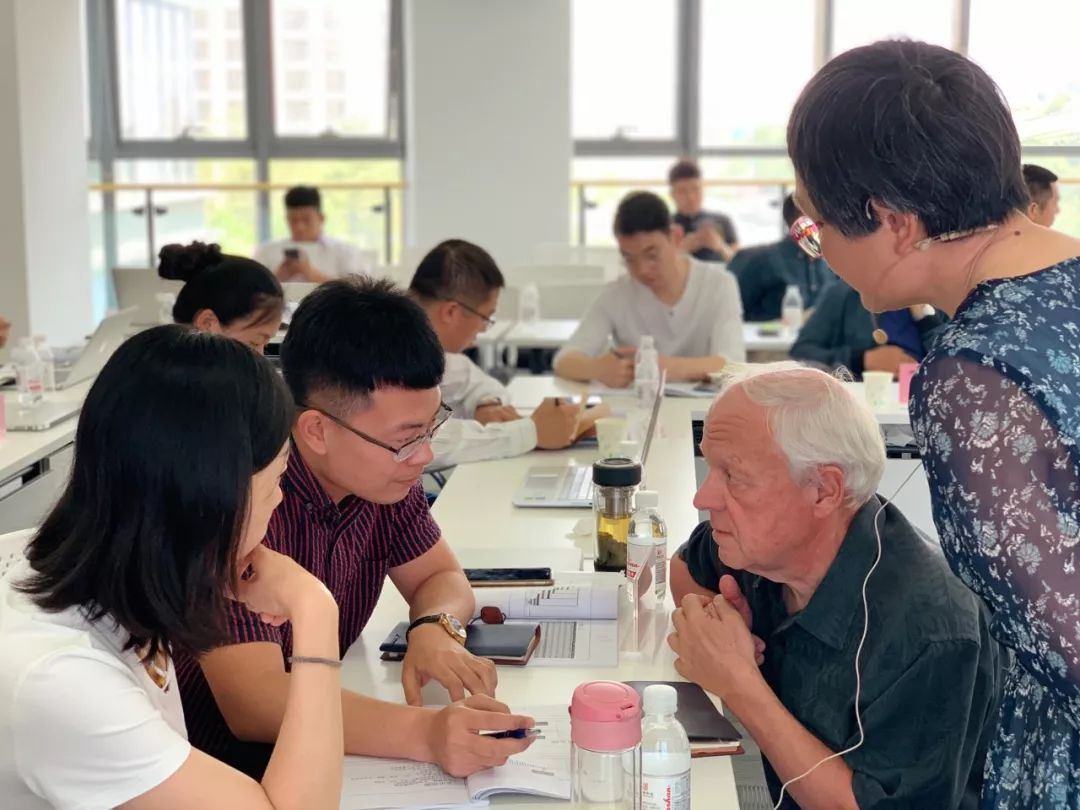
Photo courtesy of Claude Leglise: 1x1 conversation with an entrepreneur
For more information about please visit SVA Innovation website
Other interviews in our "Why Consulting?" series
Interview with Maxime Crépin (Bo 210), Bain and Company
Interview with François Théry (Li 96), Accenture
- Details
A winter gadzarts meeting took place on February 21st in Bleecker St Bar in NYC. Albina, AFAM community manager, visited NYC at this time and was able to meet some big apple-based gadzarts.
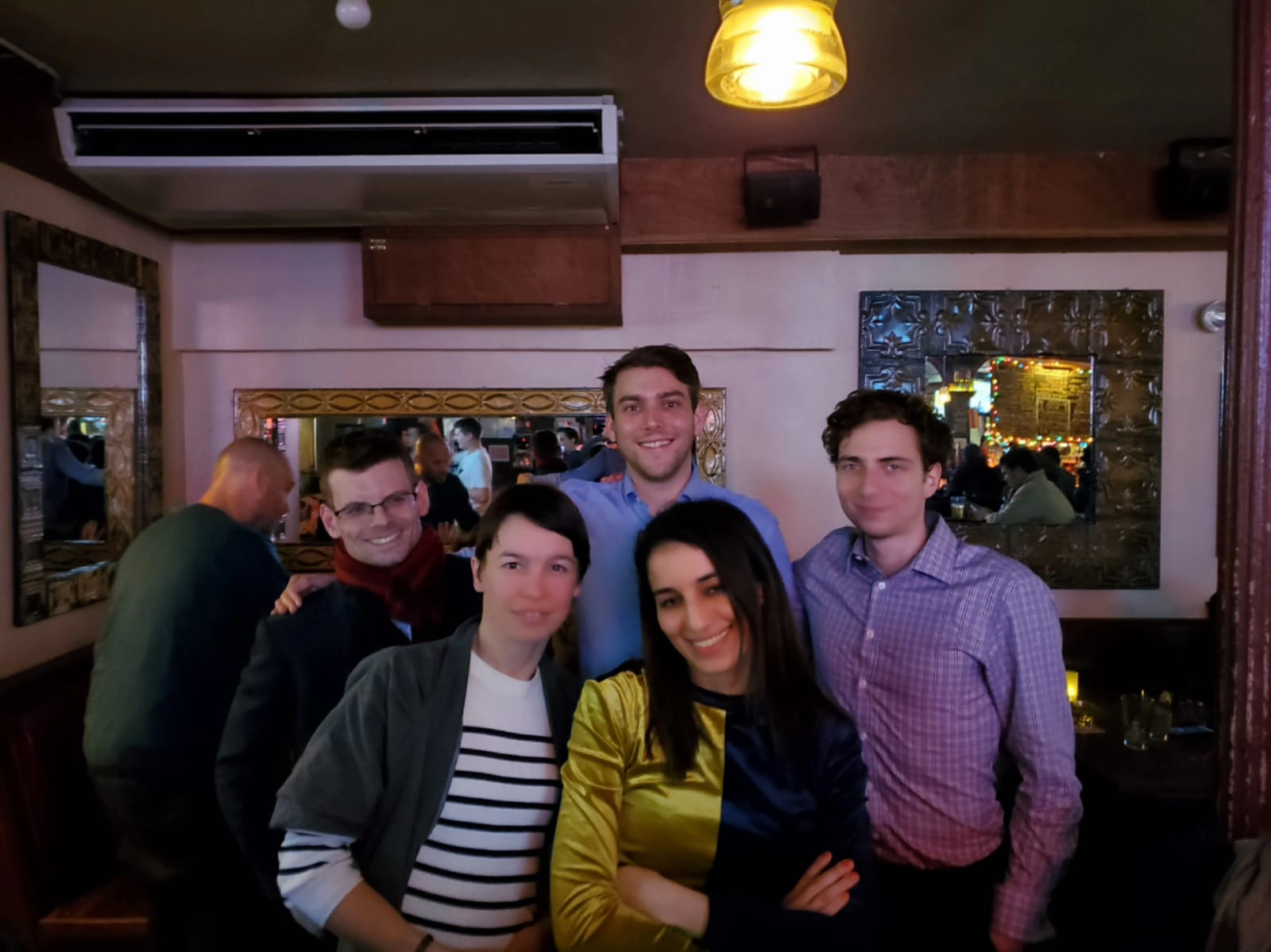
Evening fun with Jean-Baptiste, Rémy, Sacha, Asma and Albina
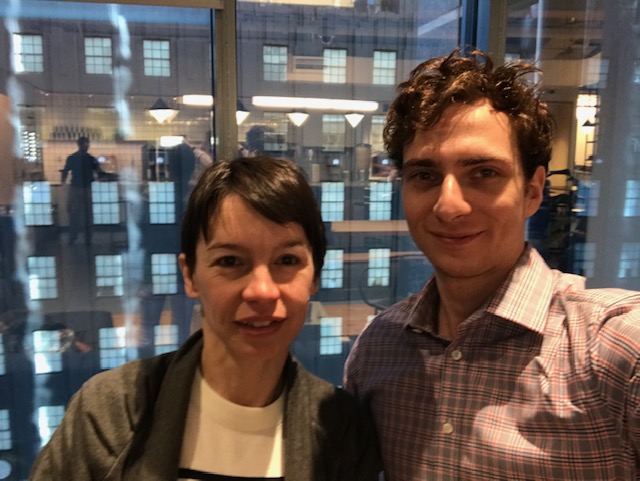
Albina, AFAM community manager and Sacha, new Est Coast Group Zident, taking coffee and talking about AFAM and gadzarts in NYC - February 21st, in the morning
- Details
On February 13th French American Innovation Days (FAID) conference on Smart Manufacturing and AI for Industry 4.0 took place in College Station, TX.
What is so remarkable about this conference?- AFAM asked Audrey Stewart, Director of International and European Development and AFAM board member.
"Smart Manufacturing is a key topic for both the French and the American governments. This conference took place within the framework of the strategic partnership between Arts et Métiers and Texas AM entitled , « AM² Transatlantic Partnership for Smart Manufacturing» and in collaboration with the French Consulate in Houston. The objective was to bring together academia, companies, start-ups and government both sides of the Atlantic to address the challenges of Industry 4.0 in smart manufacturing. More than 180 participants, including 15 French companies based in the US discussed the opportunities of smart manufacturing and AI for Industry 4.0. An excellent opportunity for AM² to promote its scientific excellence in this field with the strong support of the French Consulate in Houston."
3 gadzarts, exchange students, currently pursuing courses at Texas A&M attended the conference along with 2 Arts et Metiers researchers Sébastien Jégou et Mourad El Hadrouz.
One of the students Thomas Jeanneau (Cl 218) commented:
“What I liked the most about the event was the way it connected American and French researchers. It involved great speakers, experts in their fields and it covered crucial topics for Industry 4.0. As an exchange student, it was also a great opportunity for me to network and meet professionals here in the US”.
We are looking forward to next conferences and workshops co-organized by our school and Texas A&M both here in the US and in France.
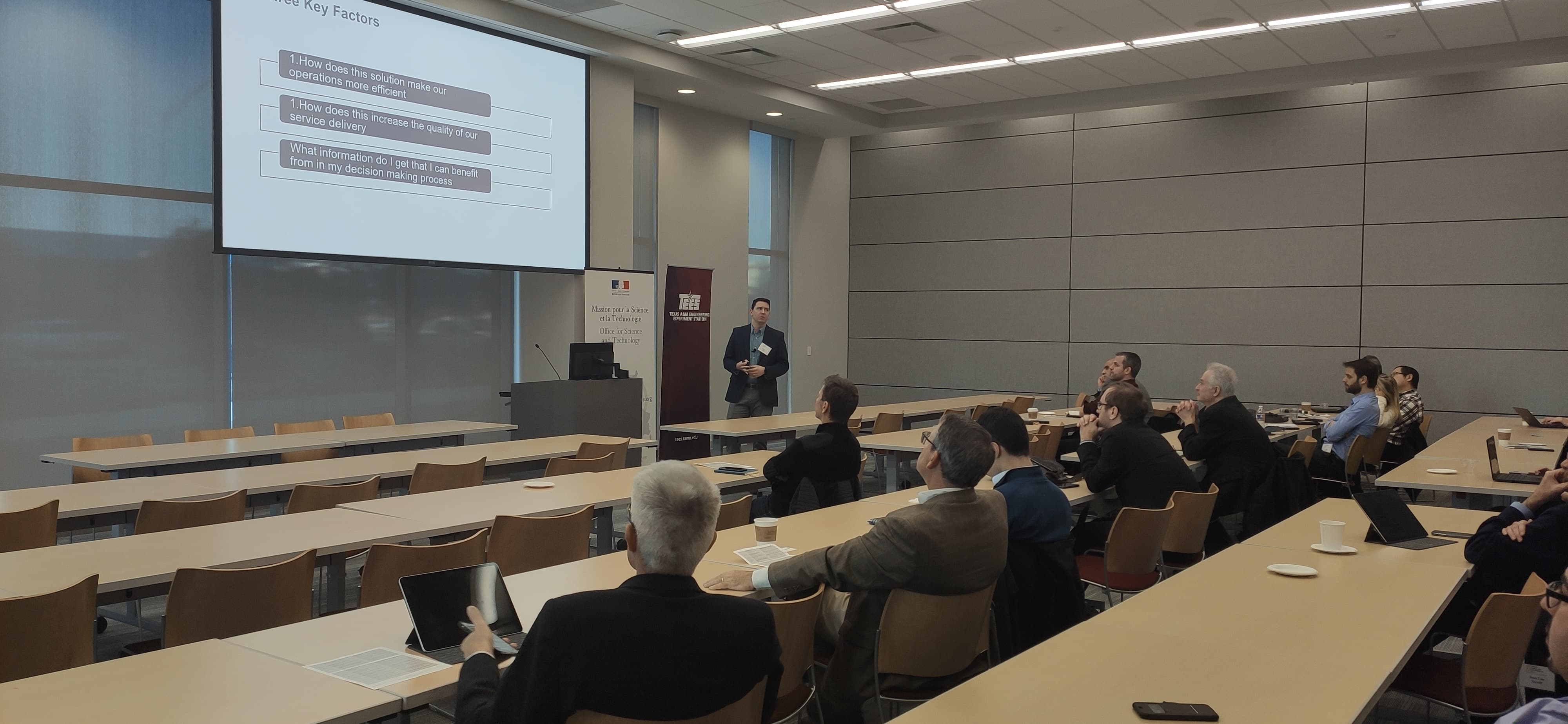
During the conference: photo courtesy of Thomas
For more information about FAID: click here
- Details
What is important to consider when you want to start working in Consulting and what is a typical day of a Consultant at Bain and Company – replies Maxime Crépin (Bo 210)
AFAM: Please tell us more about what your consulting role is about?
Maxime: My role is to help business leaders achieve their goals, and address a wide range of issues, from pure strategy to more operational topics. I've spent most of time helping large tech clients' sales organizations go through mergers or help them design their Go-To-Market strategy. I've also worked on a dozen of private equity due diligences.
AFAM: How did you get where you are now?
Maxime: After Arts et Métiers, I went to UC Berkeley for a Masters' degree. I then joined Bain as an Associate Consultant in 2014. After my promotion to Senior Associate Consultant in 2017, I decided to accept Bain's offer to sponsor me for business school and applied to INSEAD. At the end of 2017, I interned for a start-up in Santa Monica, Surf Air, where I worked as a revenue and strategy manager, working closely with the director of strategy and the CEO. I got my MBA from INSEAD In 2018 and went back to Bain in the San Francisco office.
AFAM: What does your typical day look like?
Maxime: I'm typically on the client site from Tuesday to Thursday. I always start my day by checking my inbox - given our clients tend to be large global organizations, emails can come in at any time of the day and night. I'll usually have a few hours of meetings a day - some of them will be internal (getting input from our own leadership team to make sure we're headed in the right direction), some of them with clients. At a more junior level, a lot of these client meetings revolve around gathering and understanding data, and as I'm getting more senior they start becoming more about what the right answer is (e.g., what org should a type of sales rep roll into). The rest of the day will be split into data analysis (especially true at a more junior level), using Excel but also increasingly tools such as Alteryx or Tableau, which are better suited for large datasets, data gathering (expert network calls, secondary research…) and slide making. 4. What do you like in your consulting role? I love working with extremely sharp people, and learning a lot everyday by working along with them. I also love seeing the impact we have - when we start a new project, the situation often looks messy but by asking the right questions and guiding our clients go in the right way, we're able to achieve awesome performance together. In addition, becoming clients' trusted advisor feels very rewarding. This is also very much a "work hard, play hard" kind of culture, which fits me perfectly.
AFAM: What do you like in your consulting role?
Maxime: I love working with extremely sharp people, and learning a lot everyday by working along with them. I also love seeing the impact we have - when we start a new project, the situation often looks messy but by asking the right questions and guiding our clients go in the right way, we're able to achieve awesome performance together. In addition, becoming clients' trusted advisor feels very rewarding. This is also very much a "work hard, play hard" kind of culture, which fits me perfectly.
AFAM: What are the challenges of your consulting job?
Maxime: The lifestyle can sometimes be a little intense, given the nature of professional services: we need to be available for our clients, and this often means that we need to address their most pressing questions late in the evening or on weekends. Some people also get tired of traveling, but Bain is a great place for that given most of our staffing is done locally. 6. What skills and qualities do engineers need to be successful consultants? Engineers are very well suited for consulting - problem solving is one of the key pillars of consulting and this is an area engineers excel in. The areas where engineers tend to lack the most are client and presentation skills, as well as the ability to work in an environment where there is no single, perfect option.
AFAM: What skills and qualities do engineers need to be successful consultants?
Maxime: Engineers are very well suited for consulting - problem solving is one of the key pillars of consulting and this is an area engineers excel in. The areas where engineers tend to lack the most are client and presentation skills, as well as the ability to work in an environment where there is no single, perfect option.
AFAM: What advice would you give to an engineering student who wants to work in consulting? Start as a junior in a large management consulting company, find an internship in a boutique firm, become an expert in a certain field before breaking into consulting........?
Maxime: I would start directly working in management consulting, given most of the job is best learnt on the job itself, and I would spend a lot of time evaluating the nuances between the firms. For instance, the Bain staffing model is very different from the one McKinsey offers, and this is something important to consider. And if consulting doesn’t work straight out of engineering school, I would work in a different field for 2-5 years and then do an MBA to make the switch to consulting.
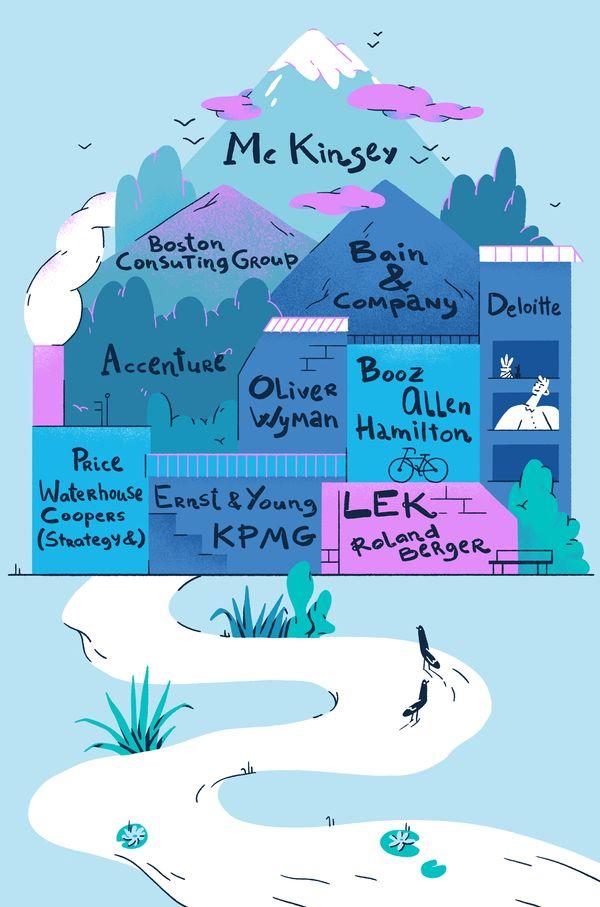
Consulting firms according to caseinterview.com
Discover other interviews of "Why Consulting?" series:
François Théry (Li 96), Accenture
About internship opportunities at Bain and Company in the US:
How to Apply: Please apply via your campus career center in the US and the Bain and Company Careers website.
- Details
Here we are, in the new year, with a new series of interviews "Why Consulting?" (please check out our last series "Food for Thought").
Before asking the question "Why Consulting?" to our interviewees, gadz'arts working in a consulting sector in the United States, we asked it ourselves. Why Consulting and not another series of interviews?
The answer is simple. A lot of Arts et Metiers graduate engineering students who contacted AFAM looking for internships in the US, are interested in Consulting. And when we ask them "Why?", a lot of them are lost, not knowing what to say, probably thinking that saying "I will earn a lot of money" is not a good answer, or at least not the only one.
What is the right answer (if there is one)? We will be trying to understand it with the help of our alumni, professionals, experts, Consulting enthusiasts.
François Thery (Li 96), Technology Consulting Senior Manager at Accenture, SF Bay Area, CA, is one of them.
AFAM: Hello, François, and thank you for replying to our questions. Please tell us more about what your consulting role is about?
François: My role is complex transformation delivery expert, leading implementation of large scale solution such as ERP (Enterprise resource planning - business process management software that allows an organization to use a system of integrated applications to manage the business and automate many back office functions related to technology, services and human resources) and Saas (software is a service - is a software distribution model in which a third-party provider hosts applications and makes them available to customers over the Internet).
My primary industry focus area is high tech companies, with experience in Configure Price Quote and Supply Chain Transformation initiatives.
AFAM: How did you get where you are now?
François: I started my professional career in Glass Manufacturing and Operations Management, first on the East coast for 12 years and afterwards on the West Coast. I was involved into managing large projects either in process improvement (lean manufacturing, six sigma) or customer specific programs, which helped me transition easily to Accenture and complex transformation delivery.
I joined Accenture five years ago as I was looking for a career change and was fortunate to join this great company.
AFAM: What does your typical day look like?
François: What I like as a Technology consultant is that there is no typical day. The principal activity is to work with our client on addressing their needs, coupled with managing a delivery team. There are plenty of opportunities at Accenture to contribute in various projects, such as coaching new joiner, performing volunteer work in local communities, or leading technology working groups. This diversity fits well with my aspiration both personally and professionally.
AFAM: What kind of volunteer work are you talking about?
François: It can be helping out at a local shelter, work with the San Francisco City to improve their dispatching system, or suggest solutions to accelerate the response time of the wildfire!
AFAM: What do you like in your consulting role?
François: As mentioned previously, I like the opportunity to work with various teams and companies.
One area that I really like is being able to bring value and a sense of purpose to our client. We strive to make an impact to the daily life of our client by developing meaningful and cutting-edge solutions. Witnessing the results and impact of our work, and the difference that we make is really a rewarding experience as a human being.
AFAM: What are the challenges of the consulting job?
François: One of the areas that keep consultants on their toes is the need to remain relevant in the work we do. The technology solutions are evolving at a pace we never saw before. It requires us to stay vigilant, always learn and challenge our beliefs and understandings.
AFAM: What skills and qualities do engineers need to be successful consultants?
François: Engineers usually bring with them rigor and methods to the consulting world. While these are great skills, it is not enough to be successful. The biggest skill gap I personally see is being able to communicate simply and efficiently with a client or a team. This is something that must be learnt, practiced and mastered.
Being able to make a point or explain a problem and solution will be the differentiator between getting a deal or not, having a team following you or not.
AFAM: What advice would you give to a student who wants to work in consulting? Start as a junior in a large management consulting company, find an internship in a boutique firm, become an expert in a certain field before breaking into consulting........?
François: I would recommend anyone to join a Consulting firm early in a career. Joining after spending several years in a non-consulting environment is not easy and requires a high level of adaption.
I would also recommend to be patient, curious and learn as much as possible. What makes a successful consultant is the exposure to various experiences.
As far as which type of consulting firm to join, it is a personal choice. Accenture has a great development program for consultants out of school. It is designed to learn the consulting role, get experience in projects and adapt to the company culture and core values. The specialization will come later on based on affinity and interest.

Some information about internship opportunities at Accenture in the US:
Applicants for employment in the US must have work authorization that does not now or in the future require sponsorship of a visa for employment authorization in the United States and with Accenture.
How to Apply: Please apply via your campus career center and the Accenture Careers website.
- First time together for Galette des Rois to celebrate Epiphany - Atlanta
- Looking back and sharing the most significant moments of 2019
- Food for Thought - Interview with Florian Héraud (Bo 215)
- Food for Thought - Interview with Jean Prévot (Ch 98), Danone Manifesto Ventures
- Being Grateful....thank you from beneficiaries of Louis Magne grant

 BLOG /
BLOG /  CALENDAR /
CALENDAR /  DONATIONS /
DONATIONS /  MENTORS /
MENTORS /